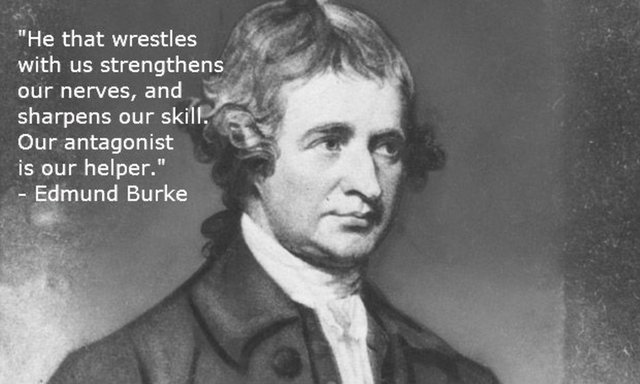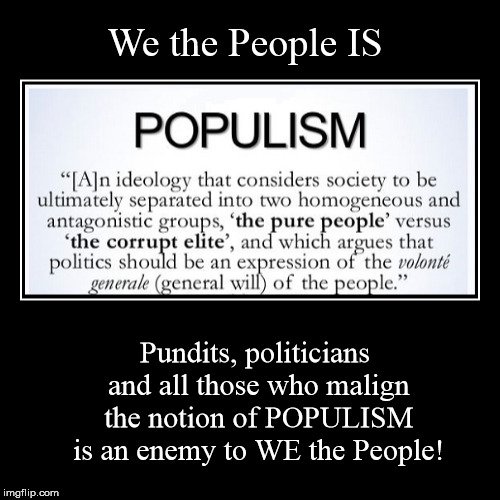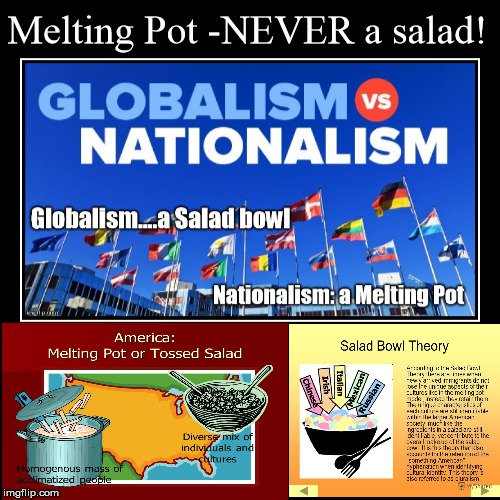Nostalgia For Traditional Conservatism

I despise American “conservatism” today, because it is not really conservatism. It is merely nationalist rightism. Historically, conservatism meant something—it stood for something! Now, it just means hatred of the left. It has not always been this way. And I do believe that there is a great deal in traditional conservatism that people on the left can agree with. Of course, I am not a conservative and I do strongly disagree with conservatism, even traditional conservatism, but I do not find the old conservatives nearly as repugnant as the new ones. Traditional conservatism refers to the ideas espoused by such figures as Edmund Burke, Richard M. Weaver, Russell Kirk, G. K. Chesterton, Hilaire Belloc, Wilhelm Röpke, E. F. Schumacher, John Ruskin, Leopold Kohr, and Wendell Berry.
Traditional conservatism can be seen as something akin to medievalism. It looks to the late Middle Ages as a golden age of human civilization, and this is not entirely without reason. In that time period, poverty had been greatly reduced in Europe, wealth wasn't concentrated nearly as much as it is today, and people enjoyed far more leisure time than they do now (we actually work a lot more than people did back then). Conservatism roots its morality in the medieval religious tradition, in Christian dogma. The conservative believes that there is a difference between right and wrong. He rejects moral relativism and nihilism. He believes that the laws of morality are neither arbitrary human whims nor social constructs. The ethical rules that we must follow are universal and objective, inscribed on the human heart by our Creator. The laws of morality are a natural law, defined by our human nature—natural to us as humans. This idea is taken from Christian theology, especially as espoused by St. Thomas Aquinas but can also be based in the ideas of John Calvin and other theologians. The goal of conservatism, then, is to base its political ideals on natural law. Of course, man is a fallen creature, corrupted by sin, so the natural law must be interpreted by some uncorrupted mechanism, so Protestants tend to regard the Bible as the ultimate standard for interpreting natural law while Catholics regard the Pope as the infallible judge. This explains the tendency towards theonomy or theocracy in conservatism. Nevertheless, traditional conservatism has also been used as a justification for Christian anarchism by thinkers such as Jacques Ellul, Vernard Eller, and Dorothy Day.
Traditional conservatism has become less popular today largely because our society has become more secular. In recent years, Larry Arnhart has developed a theory of Darwinian natural right, which attempts to redeem natural law theory for our modern non-believing age. Arnhart argues that Darwinian and Aristotelian ethical naturalism can serve as a basis for natural law theory, such that you can remove God from the equation and the traditional conservative notion of natural law still remains valid. Whether human nature was fashioned by God or sculpted by millions of years of blind natural selection, human nature has emerged as it is today, such that humans have a shared set of characteristics and values. It is not that Arnhart is an atheist. He actually thinks that the naturalistic and theistic arguments for natural law are complimentary. His philosophy is merely meant to demonstrate that traditional conservatism can be reached through multiple routes and that it does not require one to believe in God per se.
The medievalist nature of traditional conservatism does not stop with its reliance on traditional Christian theology and natural law theory. Traditional conservatives also tend to venerate medieval economic institutions and practices. Conservatism puts great emphasis on agrarianism, guilds, distributive justice, and anti-largeness. They want modern political economy to be far more like the Middle Ages. Traditional conservatism is not necessarily anti-industrial, but it is predominantly anti-capitalist or anti-modernist but with an emphasize on updating pre-modernism for modern times. With Röpke, Kohr, and Chesterbelloc, for instance, you get visions of how the guiding insights of the old worldview and its traditional values can be applied to the modern world. They focus on the possibilities of how you can have modern industrial production without centralization of power, excessive concentration of wealth, or the emergence of oligopoly or monopoly. Traditional conservatives tend to want widespread distribution of wealth throughout society, such that most individuals are owners of productive property. They tend to emphasize the importance of domestic agriculture and think that domestic agriculture ought to the predominant feature within an economy. And they tend to support radical decentralization of both industry and government. When manufacturing occurs, it ought to be done on a small-scale, locally, and preferably in a co-operative manner. When political decisions are made and political tasks are undertaken, they ought to be made by the smallest and most local unit of government capable of effectively accomplishing them. Such was the vision of traditional conservatives.
While traditional conservatism, in many ways, aligns far more with the radical left, finding common ground with socialism on many points, it is wary of revolutionary and radical proposals. Conservatives prefer to stick with things that they know work, with institutions and practices that have been tried and are known to work well. They recognize that violent revolution means death and harm for many people, and they do not take that lightly. If my sister, daughter, wife, son, or brother dies in your revolution, the cost is far too great! Lives are irreplaceable and infinite in value. Furthermore, they recognize that any new social experiment carries with it the possibility of failure. The more radical the social experiment, the more likely it is to fail and result in instability. Instability is not good for anyone. So, conservatives prefer more traditional institutions and practices, valuing stability and social order over utopian dreams.
In many ways, my views align with those of the old right more so than with the left, but in other ways my views are more on the left. I guess it really depends on how you choose to define “left” and “right.” The terms (left and right) come from the French Revolution, referring to which side of Parliament people happened to sit on. The term left has four distinct meanings: pro-egalitarianism, pro-revolution, pro-democracy, and anti-authoritarianism. The term right simply meant the opposite: anti-egalitarianism, anti-revolution, anti-democracy, and anti-libertarianism. Well, most on the left and right have not identified with all four of the characteristics associated with the terms. Pierre-Joseph Proudhon and Frédéric Bastiat both sat on the left. Bastiat was no egalitarian, but he was opposed to the status quo and did oppose authoritarianism. Proudhon was revolutionary and anti-authoritarian, but he wasn’t the most egalitarian—he was kind of a racist and misogynist. The lines between left and right sometimes blur. The left is the “party of movement or change,” while the right is the “party of order.” (Until now, when the right is the party of chaos and fuckery, thanks to Trumpism.) Folks that just want reform—change without breaking social order—can’t easily be classified in terms of the left-right dichotomy. The old right and traditional conservatism kind of seem more left in some ways. Old conservatism had a common set of principles and values that held it together. This is in stark contrast to the new conservatism of William F. Buckley Jr. and Ronald Reagan, which tends to have opposition to the left as its defining characteristic. Modern conservatism, in the tradition of Buckley, started by synthesizing conservatism with classical liberalism and free-market ideology, but it eventually lost sight of its core medievalist values. The lack of principles on the right has led to the decline of real conservatism and the emergence of the Alt-Right and Trumpism.
Hi @ekklesiagora!
I just found your blog and enjoyed reading this post. I haven't had time to go back too far in your writings, but I appreciate your distinction here between traditional conservatism and the alt-right. I think we can see the same lack of principles and "oppositional Theology" leading to the downfall of the American church, which makes sense considering the church is the rudder of the culture (Moby Dick).
I saw in another post that you mentioned Rushdoony. I'd be interested to hear your thoughts on Rushdoony's theonomy, which is bottom-up compared to the Scottish Covenanters' theonomy, which was more top-down. Do you mind sharing?
Just to clarify, I'm an atheist. So, I don't subscribe to any of these schools of thought. Cernelius van Til, who is the most important Christian thinker of all time, in my opinion, really influenced Rushdoony's thought. I've read some Rushdoony and it's an interesting perspective, but as an atheist and Darwinian, I really have to disagree with a lot of his stuff. When I was religious, I identified as a Christian anarchist and kind of had an alternative interpretation of theonony/biblical law that was anarchistic. Jacques Ellul and Vernard Eller were main influences in that anarcho-theonomist direction.
Thanks for the answer. I fall more on the Rushdoony side of theonomy rather than Gary North.
I think I can agree with you on most of this post. For the first time! In fact, I always say that I identify as a classical liberal, because that is the way I like to proceed politically, that is, without using the State to impose my way of seeing things, however, as far as my beliefs are concerned, I identify much more with the conservatism to which you refer, the problem is that currently taking a position like that, is practically being classified as the extreme right and as a reactionary.
On the other hand, I do not agree with this:
Traditional conservatism can not be in consonance with the radical left, they are two ways of conceiving the world completely different, the left "Marxist" does not even believe in morality, and thinks that everything that defends conservatism is its privileged position.
Let me clarify what I meant by that. So, classical conservatives were critical of capitalism (which they saw as a system of wage-slavery, with wealth concentrated at the top). Their critique resembled leftist critiques in many ways. The difference was the solution they proposed. The conservatives proposed widespread distribution of ownership (make private property the foundation of society and ensure nearly everyone has some)... Russell Kirk touches on this in "The Conservative Mind"...socialists, on the other hand, proposed replacing private property with public property. So, conservatism was a decentralist approach to markets, no centrally-planned economy but also no centrally-planned industry for the most part—opposed to both big business and big government. (Cf. Chesterton, Belloc, Kohr, Schumacher, Kirk, Weaver, Wendell Berry) This is, for the most part, the position that I've come to take recently, in opposition to the far-left position. So, my views at the moment are a mixture of center-right and center-left. (Very different from where I was coming from when you first stumbled across my Steemit posts.)
Anyways, that is what I meant, there is very real agreement between conservatives and socialists in their opposition to capitalism (which they both happen to define the same way).
As for Marxism, I think you have a very limited and skewed perspective on it. Marx did believe in morality. His theory of ethics was very similar to Larry Arnhart's. (Arnhart is a conservative writer, so obviously their views don't really align, but the general meta-ethical framework is basically identical.) Most marxists (democratic socialists, council communists, libertarian marxists) put ethics and morality at the forefront. That's why feminist ethics, queer liberation ethics, and such got labeled "cultural marxism." Leftists really do believe that inequality is morally repugnant. They're all about ethics and morality. They just have different views about what is right and what is wrong.
Great thoughts and illustrative post you shared thanks a lot for sharing that and nice to see you after a long time :)
Sovereignty....this is our Land...not the worlds...
